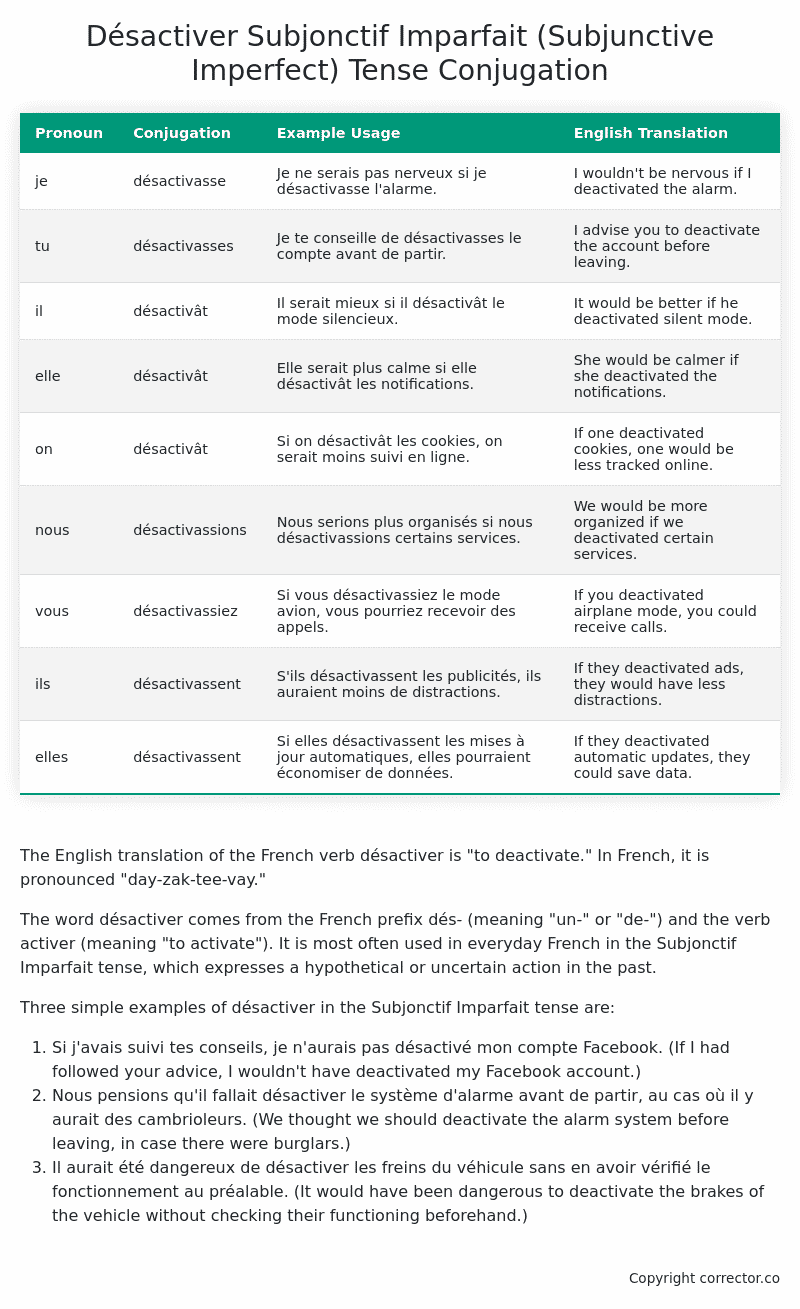Subjonctif Imparfait (Subjunctive Imperfect) Tense Conjugation of the French Verb désactiver
Introduction to the verb désactiver
The English translation of the French verb désactiver is “to deactivate.” In French, it is pronounced “day-zak-tee-vay.”
The word désactiver comes from the French prefix dés- (meaning “un-” or “de-“) and the verb activer (meaning “to activate”). It is most often used in everyday French in the Subjonctif Imparfait tense, which expresses a hypothetical or uncertain action in the past.
Three simple examples of désactiver in the Subjonctif Imparfait tense are:
- Si j’avais suivi tes conseils, je n’aurais pas désactivé mon compte Facebook. (If I had followed your advice, I wouldn’t have deactivated my Facebook account.)
- Nous pensions qu’il fallait désactiver le système d’alarme avant de partir, au cas où il y aurait des cambrioleurs. (We thought we should deactivate the alarm system before leaving, in case there were burglars.)
- Il aurait été dangereux de désactiver les freins du véhicule sans en avoir vérifié le fonctionnement au préalable. (It would have been dangerous to deactivate the brakes of the vehicle without checking their functioning beforehand.)
Table of the Subjonctif Imparfait (Subjunctive Imperfect) Tense Conjugation of désactiver
| Pronoun | Conjugation | Example Usage | English Translation |
|---|---|---|---|
| je | désactivasse | Je ne serais pas nerveux si je désactivasse l’alarme. | I wouldn’t be nervous if I deactivated the alarm. |
| tu | désactivasses | Je te conseille de désactivasses le compte avant de partir. | I advise you to deactivate the account before leaving. |
| il | désactivât | Il serait mieux si il désactivât le mode silencieux. | It would be better if he deactivated silent mode. |
| elle | désactivât | Elle serait plus calme si elle désactivât les notifications. | She would be calmer if she deactivated the notifications. |
| on | désactivât | Si on désactivât les cookies, on serait moins suivi en ligne. | If one deactivated cookies, one would be less tracked online. |
| nous | désactivassions | Nous serions plus organisés si nous désactivassions certains services. | We would be more organized if we deactivated certain services. |
| vous | désactivassiez | Si vous désactivassiez le mode avion, vous pourriez recevoir des appels. | If you deactivated airplane mode, you could receive calls. |
| ils | désactivassent | S’ils désactivassent les publicités, ils auraient moins de distractions. | If they deactivated ads, they would have less distractions. |
| elles | désactivassent | Si elles désactivassent les mises à jour automatiques, elles pourraient économiser de données. | If they deactivated automatic updates, they could save data. |
Other Conjugations for Désactiver.
Le Present (Present Tense) Conjugation of the French Verb désactiver
Imparfait (Imperfect) Tense Conjugation of the French Verb désactiver
Passé Simple (Simple Past) Tense Conjugation of the French Verb désactiver
Passé Composé (Present Perfect) Tense Conjugation of the French Verb désactiver
Futur Simple (Simple Future) Tense Conjugation of the French Verb désactiver
Futur Proche (Near Future) Tense Conjugation of the French Verb désactiver
Plus-que-parfait (Pluperfect) Tense Conjugation of the French Verb désactiver
Passé Antérieur (Past Anterior) Tense Conjugation of the French Verb désactiver
Futur Antérieur (Future Anterior) Tense Conjugation of the French Verb désactiver
Subjonctif Présent (Subjunctive Present) Tense Conjugation of the French Verb désactiver
Subjonctif Passé (Subjunctive Past) Tense Conjugation of the French Verb désactiver
Subjonctif Imparfait (Subjunctive Imperfect) Tense Conjugation of the French Verb désactiver (this article)
Subjonctif Plus-que-parfait (Subjunctive Pluperfect) Tense Conjugation of the French Verb désactiver
Conditionnel Présent (Conditional Present) Tense Conjugation of the French Verb désactiver
Conditionnel Passé (Conditional Past) Tense Conjugation of the French Verb désactiver
L’impératif Présent (Imperative Present) Tense Conjugation of the French Verb désactiver
L’infinitif Présent (Infinitive Present) Tense Conjugation of the French Verb désactiver
Struggling with French verbs or the language in general? Why not use our free French Grammar Checker – no registration required!
Get a FREE Download Study Sheet of this Conjugation 🔥
Simply right click the image below, click “save image” and get your free reference for the désactiver Subjonctif Imparfait tense conjugation!

Désactiver – About the French Subjonctif Imparfait (Subjunctive Imperfect) Tense
Formation
Common Everyday Usage Patterns
Interactions with Other Tenses
Subjonctif Présent
Indicatif Passé Composé
Conditional
Conditional Perfect
Summary
I hope you enjoyed this article on the verb désactiver. Still in a learning mood? Check out another TOTALLY random French verb conjugation!


